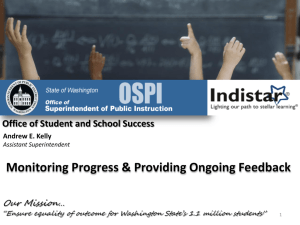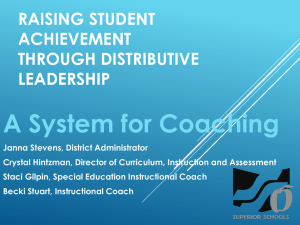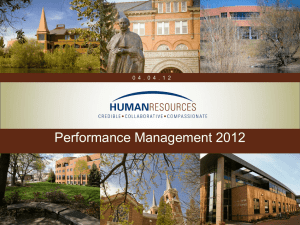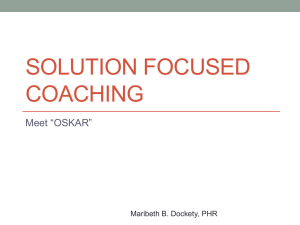HOW DO CHIEF EXECUTIVES EXPERIENCE COACHING?
advertisement
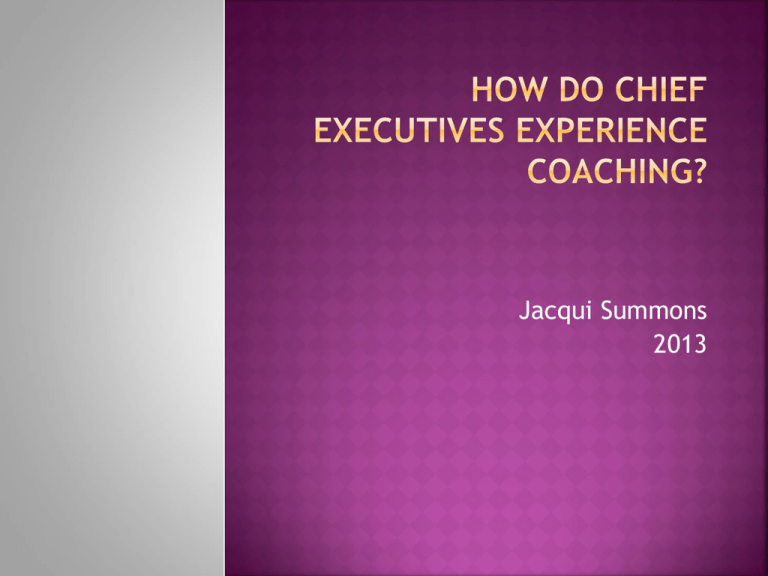
Jacqui Summons 2013 To see whether the experience of CEOs being coached by external coaches would uncover any useful findings about: The type of coaching which they most valued Whether there were any common themes reported in the relationship between coach and coachee How they decided which coach to work with What they actually experienced in the sessions and what impact, if any, they believe coaching had on their performance I had worked in a close relationship with 6 /7 CEOs ( as HR Director) Observed at close hand the “loneliness” of the number one position Seen benefits of executive coaching (and times when it was rejected with a high cost) This background proved to be both a benefit and a disadvantage… New insights into the way in which executive coaching is experienced by leaders of smaller businesses Coaching was generally sought by the CEOs and not set up as an organisational wide initiative Many previous studies carried out into the impact of executive coaching had focussed on organisationally driven coaching programmes (often through the observations of others, not in the “voice” of the CEO) The findings could be of interest to other CEOs that are considering using the support of an executive coach, particularly in their first CEO role They may provide some insight for executive coaches wishing to coach CEOs about some of the drivers for this group and what they particularly value about coaching. Boards, Chairmen, PE Investors may gain a greater understanding of the benefits of coaching for CEOs Phenomenological research study explored the experience that five Chief Executive Officers (CEOs) had when being coached by executive coaches. An in depth review of their experiences as described by them in detailed semi structured interviews, lasting between 1 and 2 hours. Results were shared with experienced Executive Coaches (not the coaches of the participants) Name ( Pseudonym used to protect confidentiality) Ken Size and type of Organisation CEO experience Length of time working with coach A privately owned employee communication consultancy CEO for about 7 years since starting the business. 5 years working with the same coach Currently working with a career coach in between roles, but had previously worked with an Executive Coach when CEO of the logistics business For the last two years, since starting CEO role. About 40 employees, 4 million turnover. James Not currently in role. Previously CEO of logistics business (approximately 200M revenue) Has held the role of CEO for several years Charles Listed on LSE since 2005 Clinical trials management and patient recruitment organisation in Europe. Operated from 24 sites in 8 countries CEO of a privately owned recruitment company founded in 2010 Has held CEO post in current company only, since 2011 Andrew Kris Land development company (PE backed) Is in his first CEO role and has been in that role since 2010. In his first CEO role since 2012 Approximately 2 years Approximately 2 years How did the methodology work? What did I discover? “ I almost take on a different personality. No, what I mean is I am in a place where I totally relax. My mind is clear. I feel like I am talking to myself. I feel that I can say almost anything and it is acceptable….. I don’t need to impress or motivate or inspire… What did I need? Drivers for coaching Desire for self-development prompts desire for coaching Need to build competence quickly when starting a business Need for a trusted confidante Feeling a gap in existing network, feeling isolated Feeling loneliness Fear of sharing concerns with team or Chairman Transition as a catalyst Transition was a driver for coaching: o Starting a business o Exiting from a business o Career change o First CEO role Pre coaching views on development Committed and interested in the development of themselves and others Natural desire to improve themselves Readily self-reflective Pre coaching concerns about coaching Scepticism exists for some pre-coaching Aware that it can be seen as a sign of weakness to be coached How did I choose a coach and how did coaching relationship develop? Choosing a coach Contracting Confidentiality Relationship with Coach It took time to select a coach, process of selection was generally quite informal In some cases more than one coach was met before a final decision was made Selection seemed to be one of chemistry and “fit” Informal Dealt with timing of sessions and requirement for 360 feedback in some cases, but little further detail There was some limited discussion about objectives (particularly to demonstrate ROI) Divergence of views about whether coach should work with CEO and senior team Trust is a critical point for all regardless of direction on this point Described as a unique relationship, not similar to that which they have with others Many hold coaches in very high esteem Relationship seems close on a one to one basis One description of a “caring” relationship Limited concern about dependency What was the Coaching like? Timing, location, preparation and follow up Model, structure and process CEO feeling in sessions Sessions were every 4-6 weeks lasting 23 hours All sessions were off site Considerable preparation was done by CEO for sessions “homework” sometimes set by coach/reading materials suggested Follow up sometimes includes note taking and always working on agreed actions CEOs didn’t recognise “models”, but talked through structure Coach reminded client of agreed areas to work on and values in some cases and challenged divergence from these In some, but not all, cases 360 feedback and psychometric testing supplemented the process in sessions early on. Clients valued the alternative perspective that the coach often presented Relaxed Able to open up and say things to coach that they would not say to others Reflective space and time away from the day to day work Could be a tiring process What did I value and did I feel that I benefited from Coaching? What did I value in my coach? Did I benefit from Coaching? Value a sounding board, but do not need a coach with business or leadership background Value a challenging approach Being able to get through strategic goals more quickly and making sense of a multitude of competing priorities Dealing more effectively with Stakeholders Handling difficult relationships more effectively, particularly within the team Increasing the effectiveness of their teams Becoming more self-reflective and adapting behaviours as a result of this self-reflection Consulted 5 Executive coaches with extensive experience of coaching at CEO level Confirmed some findings but strongly challenged some too Overall a useful way of keeping my mind “open” as I concluded Reaffirmed my view of usefulness of research – quite welcome in the dark days of writing up!! "Leadership is a lonely thing. When you have to make tough decisions in relation to strategy or very important issues you have to take them in the end alone.” CEO of Lloyds, Antonio Horta-Osorio (interviewed by Robert Peston 2013)



